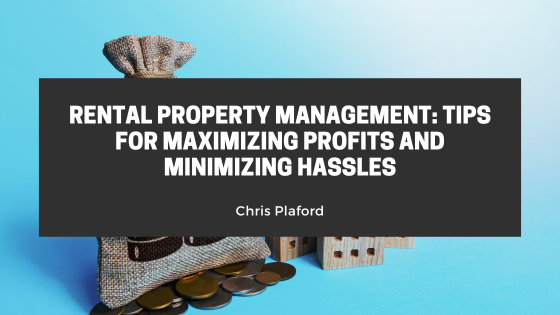Investing in rental properties can be a lucrative endeavor, but it comes with its fair share of challenges. Effective rental property management is essential for both maximizing profits and minimizing the hassles associated with property ownership. Whether you’re a seasoned investor or just starting out, here are some valuable tips to help you succeed in the rental property market.
Screen Tenants Thoroughly: The foundation of successful rental property management lies in selecting reliable tenants. Conduct rigorous tenant screenings, including background and credit checks, rental history, and employment verification. Choosing responsible tenants can help minimize issues and ensure a steady rental income stream.
Set Competitive Rental Rates: Research the local rental market to determine competitive rates for your property. Setting the right rental price will attract potential tenants and maximize your income without overpricing and driving tenants away.
Regular Maintenance and Upgrades: Keep your property well-maintained to attract and retain tenants. Address maintenance requests promptly, conduct regular inspections, and consider making upgrades that increase the property’s value and desirability.
Develop Strong Communication: Open and effective communication with tenants is crucial. Establish clear lines of communication for maintenance requests, lease agreements, and any concerns that may arise. Good communication can help prevent misunderstandings and foster positive landlord-tenant relationships.
Create Comprehensive Lease Agreements: A well-written lease agreement protects both you and your tenants. Clearly outline rent payment terms, rules, responsibilities, and policies to avoid disputes down the line.
Implement a Tenant Retention Strategy: Retaining good tenants can save you time and money. Consider offering lease renewal incentives, maintaining a responsive attitude to their needs, and creating a pleasant living environment.
Understand Local Laws and Regulations: Familiarize yourself with local rental laws and regulations to ensure you’re operating within legal boundaries. This knowledge will help you avoid costly legal issues.
Automate Administrative Tasks: Property management involves a lot of administrative work. Utilize property management software to streamline tasks such as rent collection, maintenance tracking, and tenant communication.
Plan for Vacancies: Even with thorough tenant screening, vacancies are inevitable. Set aside funds to cover mortgage payments and maintenance costs during periods of vacancy.
Consider Professional Property Management: If managing your property becomes overwhelming, hiring a professional property management company could be a wise decision. They have the expertise to handle everything from tenant screening to maintenance, allowing you to focus on other endeavors.
Regularly Review Finances: Keep a close eye on your property’s financial performance. Regularly review your budget, income, and expenses to identify areas for improvement and cost-cutting.
Embrace Technology: Take advantage of technology to market your property efficiently, manage online listings, and facilitate virtual tours. Embracing digital tools can save time and expand your reach.
Account for Market Trends: Stay informed about market trends and economic changes that could affect rental demand and pricing in your area. Flexibility and adaptability are key to maintaining profitability.
Effective rental property management requires a combination of organization, communication, and strategic planning. By implementing these tips, you can navigate the challenges of property ownership while maximizing profits and minimizing hassles. Remember that success in rental property management is an ongoing journey that involves continuous learning and adaptation to the ever-changing real estate landscape.
